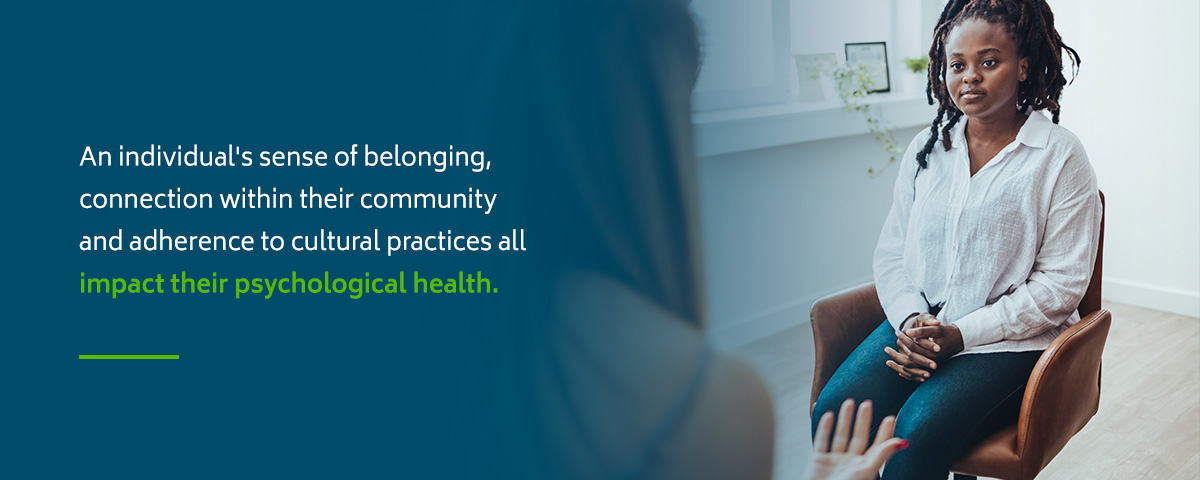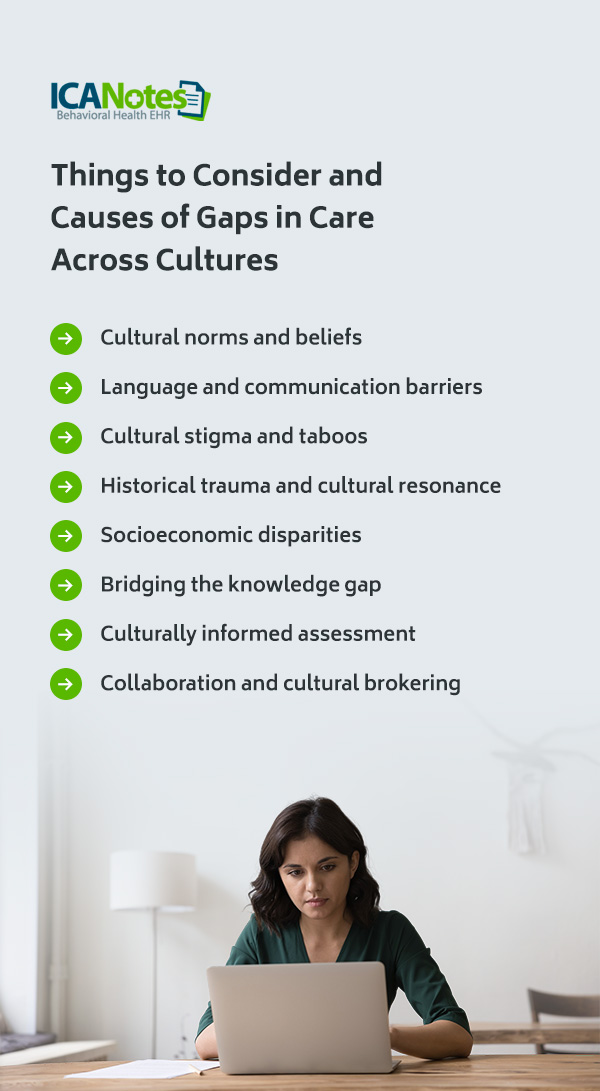
How to Provide Culturally Responsive Care in Mental Health Care
As professionals in behavioral health, it's essential to acknowledge the daily impact of culture on mental health. Responsive care is a pragmatic approach that involves recognizing the influence of cultural backgrounds on mental health experiences. You can develop a therapy plan that dismantles barriers and fosters trust by understanding how culture affects mental health.
Responsive care is about more than simply observing and acknowledging cultural disparities — it's about embracing those differences. You can use this cultural diversity to enhance mental health outcomes in your practice. Continue reading to understand responsive therapy and gain practical insights into its application in your clinical practice.
Understanding Culturally Responsive Therapy
Culturally sensitive therapy is vital because it recognizes the influence of cultural backgrounds on a person's mental health. In modern therapy practices, this concept can help behavioral health clinicians bridge the gap between a patient's diverse cultural experiences and effective psychological support. Essentially, it's about recognizing how a person's cultural background shapes their thoughts, emotions and behaviors.
As a therapist, embracing this approach means integrating cultural insights into your sessions and tailoring your approach to suit each client's unique needs. It's like enriching your toolbox with strategies that resonate with your clients on a deeper level.
This approach enhances the therapeutic process and nurtures a stronger connection between you and your clients. It's saying, "I understand you and your background and I'm here to support you in a way that truly speaks to you." So, when you delve into culturally responsive therapy, you're not just offering therapy — you're offering a personalized journey toward healing and growth that respects and celebrates each individual's cultural identity.
Let's explore strategies to integrate this awareness into your therapy sessions.
Moving Beyond Traditional Approaches
Contemporary therapy diverges from traditional models that overlook cultural differences. It represents a departure from standard treatment methods and moves toward an approach that values and integrates the diverse cultural identities of each person. The aim is to ensure effective therapy and cultivate an environment that respects and considers the cultural contexts through which clients navigate their mental health journeys.
Recognizing Cultural Context
Therapists practicing responsive care understand the pivotal role of culture in shaping an individual's identity. They acknowledge that cultural context shapes emotions, coping mechanisms, perceptions of seeking help and the therapeutic dynamic.
Considering Culture in Therapy
Cultural considerations in therapy involve understanding a client's beliefs, values and experiences. This encompasses recognizing how cultural norms and values might influence one's worldview, thoughts, behaviors, relationships and emotional expression. It also involves being mindful of potential assumptions, biases and judgments that might emerge during the therapeutic process.
Embracing a Holistic Healing Perspective
Culturally sensitive therapy adopts a holistic view of the healing journey. It acknowledges that well-being surpasses managing symptoms and involves a profound understanding of cultural factors contributing to mental health concerns. By integrating an individual's cultural norms, values and beliefs, therapists can tailor interventions that resonate, fostering enduring well-being beyond surface-level improvements.
The Significance of Cultural Competence

Cultural competence is a fundamental skill set at the heart of responsive therapy that helps behavioral health clinicians understand diverse cultural backgrounds, beliefs and practices. Armed with this understanding, therapists can establish meaningful connections, communicate effectively and adapt interventions to each individual's cultural context.
Tailoring Strategies for Each Individual
Culturally sensitive therapy avoids a one-size-fits-all approach. Instead, it supports a collaborative process between therapists and patients. They co-create treatment plans that align with the patient's cultural values. This might involve integrating cultural rituals, narratives or traditional practices into the therapeutic journey, fostering a sense of familiarity and trust.
How Does Culture Affect Counseling?
Recognizing the intricate relationship between culture and mental health is a cornerstone for behavioral health care practitioners. An individual's cultural background shapes their perspectives on mental well-being, underscoring the critical nature of grasping this connection.
What Does It Mean to Be a Culturally Competent Counselor?
Being a competent counselor means recognizing and understanding diverse cultural and ethnic backgrounds. This includes grasping various cultural beliefs, values and customs that can impact a client's life experience while also being mindful of potential biases or stereotypes. It entails creating an open and safe space for clients to express themselves and working together to develop a treatment plan tailored to their needs.
Responsive therapy highlights the intricate relationship between culture and mental health. It transcends traditional treatment models, embracing personalized strategies. Practitioners can deliver impactful and sensitive care by acknowledging the weight of cultural context, nurturing cultural competence and customizing techniques for each unique individual. This approach honors the diversity of identities and experiences within their client base.
Cultural Impact on Seeking Help
Culture acts as a guide for an individual's approach to seeking help for mental health issues. Distinct cultural norms and beliefs determine whether someone feels comfortable seeking professional help. Being attuned to these cultural influences empowers clinicians to engage effectively with clients and design interventions that align with their cultural comfort zones.
Emotional Expression Across Cultures
The diverse mosaic of cultural backgrounds influences how emotions are conveyed and understood. Cultural norms influence how clients communicate their emotional distress. Clinicians well-versed in these variations establish an environment where clients feel heard and appreciated, fostering more meaningful therapeutic relationships.
Identity and Well-Being Connection

Cultural identity is linked with mental well-being. An individual's sense of belonging, connection within their community and adherence to cultural practices all impact their psychological health. Recognizing this inherent connection allows clinicians to help conversations that honor the client's identity, integrating pertinent strategies into their treatment journey.
Moving Beyond Stereotypes
Cultural stereotypes can wield a large influence over mental health experiences. People from specific cultural backgrounds might face biased attitudes exacerbating their emotional struggles. Culturally responsive care necessitates dismantling these stereotypes, creating a secure space where clients can address their concerns without the weight of judgment or bias.
Navigating Language and Communication
Language, a conduit for understanding, can sometimes become a potential obstacle, particularly in mental health discussions. Responsive care demands the acknowledgment of language barriers and the formulation of practical communication approaches. This might entail utilizing interpreters or adapting communication methods to bridge potential gaps.
Incorporating Cultural Traditions
Cultural traditions and practices can serve as potent therapeutic tools. Recognizing and incorporating cultural rituals, storytelling and healing practices into therapy sessions can cultivate a sense of familiarity and trust. Clinicians who engage with clients on these cultural aspects create an environment where cultural identities are celebrated and empowered.
Family and Community Dynamics
Family and community dynamics play pivotal roles in mental health in many cultures. Clinicians who understand these dynamics' significance can integrate family and community engagement strategies into treatment plans. This acknowledges cultural norms and harnesses vital support systems for clients' well-being.
Holistic Well-Being Through Cultural Awareness
Understanding the profound interplay between culture and mental health lays the foundation for holistic well-being. Cultural awareness in action involves:
- Recognizing culture's influence
- Addressing attitudes
- Comprehending emotional subtleties
- Honoring identity
- Challenging stereotypes
- Incorporating traditions
- Embracing family dynamics
Responsive care nurtures comprehensive healing that is sensitive, inclusive and aligned with the diverse needs of each individual.
Things to Consider and Causes of Gaps in Care Across Cultures
Navigating the complexities of mental health care necessitates an acute understanding of the factors that can create disparities in care across diverse cultural backgrounds. As behavioral health care professionals, recognizing these considerations is paramount for providing effective and fair care.
The following points explore the multifaceted elements contributing to gaps in mental health treatment and offer insights into strategies to bridge these gaps:
- Cultural norms and beliefs: Cultural norms and beliefs significantly influence perceptions of mental health and help-seeking behaviors. Differences in these norms can lead to misunderstandings and resistance to certain therapeutic approaches. Clinicians can enhance their interventions by tailoring them to align with cultural values, promoting open discussions about mental well-being.
- Language and communication barriers: While language is pivotal for effective therapy, language barriers impede meaningful communication, especially in mental health discussions. Overcoming these barriers through translation services or sensitive communication strategies ensures the vital exchange of information is conveyed and comprehended.
- Cultural stigma and taboos: Cultural stigmas can hinder individuals from seeking mental health treatment, stemming from fears of judgment or exclusion. Clinicians who acknowledge and address these stigmas establish safe spaces for dialogue, empowering clients to discuss concerns openly and fostering therapeutic alliances built on trust.

- Historical trauma and cultural resonance: The ripple effects of historical events and collective traumas can profoundly impact mental health across generations. Grasping these legacies is pivotal for providing sensitive care. By recognizing historical traumas and their enduring effects, clinicians can validate clients' experiences and develop resonating interventions.
- Socioeconomic disparities: Socioeconomic factors often intersect with cultural backgrounds, leading to unequal access to mental health resources. Clinicians must acknowledge these challenges and collaboratively identify viable care options that align with clients' means, ensuring fair access to treatment.
- Bridging the knowledge gap: Cultural competence is a learned skill rooted in education and self-awareness. Clinicians should actively educate themselves about diverse cultural backgrounds, bolstering their capacity to provide empathetic and effective care. This knowledge enables clinicians to approach clients with humility and respect.
- Culturally informed assessment: Conducting assessments with cultural sensitivity is pivotal for accurate diagnosis and treatment planning. Traditional assessment tools may need adaptations to encompass cultural nuances. Clinicians can gather comprehensive information that enhances treatment precision by incorporating culturally relevant questions.
- Collaboration and cultural brokering: Cultural brokers and community leaders play a vital role in bridging gaps in mental health care. Collaborating with these figures fosters cultural understanding and facilitates open conversations about mental well-being, cultivating trust between clinicians and clients.
Understanding and Addressing Gaps in Mental Health Care
Recognizing the factors contributing to gaps in mental health care across cultures is essential for delivering fair and effective treatment. To contribute to a more inclusive and sensitive mental health landscape, clinicians can:
- Acknowledge cultural norms
- Address language barriers
- Challenge stigmas
- Consider historical traumas
- Recognize socioeconomic disparities
- Foster cultural competence
- Adapt assessment methods
- Collaborate with cultural brokers
Instant Webinar
Never Miss the Mark: How to Ensure Your Documentation is A+ 100% of the Time!
Access this informative webinar on how to effortlessly enhance your skills in maintaining comprehensive and top-notch documentation practices for your mental health notes.
What You'll Learn:
- Importance of Excellent Documentation
- The Golden Thread
- Considerations of Documentation
- Assessments
- Treatment Planning
- Progress Notes
Integrating Cultural Competence and Responsiveness Into Your Practice
As dedicated behavioral health care practitioners, integrating cultural competence and responsiveness is pivotal for providing effective and inclusive care. Let's outline practical steps to infuse cultural awareness and sensitivity into your therapeutic approach. Adopting these insights allows you to establish an environment that embraces various cultural backgrounds and nurtures empathetic, impactful therapeutic relationships.
So, how does culture influence counseling? Here are some key points:
- Continuous self-education: Cultural competence is an ongoing journey. Engage in continuous learning about diverse cultural backgrounds, beliefs and practices. Read literature, attend workshops and expand your understanding to better connect with clients from various cultural contexts.
- Active listening and open dialogue: Develop active listening skills to comprehend clients' perspectives. Encourage open discussions about cultural factors and experiences influencing their mental well-being. An unbiased stance creates an environment where clients comfortably share their stories and beliefs.
- Flexibility in therapeutic approaches: Acknowledge that cultural backgrounds shape clients' preferences for therapeutic methods. Be flexible and willing to adapt your approach to match their comfort zones. Customizing interventions based on cultural norms encourages client engagement and therapeutic progress.
- Culturally relevant language: Use language sensitive to cultural subtleties. Avoid jargon and idioms that may not translate well or could lead to misinterpretation. Clear, pertinent communication enhances understanding and fosters a deeper connection.
- Culturally attuned assessment: Adjust assessment methods to account for cultural influences. Frame questions that respect clients' cultural backgrounds and experiences, facilitating a more accurate understanding of their mental health challenges.
- Collaborative treatment planning: Involve clients in collaborative treatment planning. Respect their insights on cultural norms, values and goals. This partnership empowers clients and nurtures a sense of ownership over their mental health journey.
- Cultural humility: Cultural humility involves recognizing the boundaries of your cultural knowledge and being open to learning from your clients. Approach each interaction with humility and view mistakes as opportunities for growth and improvement.
- Reflect and adapt: Regularly reflect on your practice and the efficacy of your responsive approach. Be prepared to adapt and refine your strategies based on client feedback and self-assessment.
Integrating cultural competence and responsiveness into your therapeutic practice is a transformative try. By committing to cultural responsiveness, you can cultivate a therapeutic environment that is inclusive, empathetic and attuned to the diverse needs of every individual you serve.
Discover ICANotes and Request a Free Demo Today
Cultural responsiveness is no longer just an option but a fundamental need. ICANotes provides an innovative solution designed to seamlessly integrate cultural competence into clinical practice. ICANotes' software empowers clinicians to deliver impactful care that respects diverse cultural backgrounds. Its user-friendly interface streamlines documentation, granting quick access to essential patient information. This facilitates the creation of tailored treatment plans that align with individual cultural values.
ICANotes goes beyond documentation by addressing communication barriers and storing language preferences for effective therapeutic interactions. The platform also provides resources that guide clinicians in implementing culturally attuned strategies into their treatment approaches, fostering deeper therapeutic relationships.
For clinicians dedicated to practicing responsive therapy, ICANotes stands as a reliable partner.
If you're ready to discover the transformative potential of ICANotes, request a free trial or view a free demonstration to experience how our software can support your journey toward providing culturally competent care. Let's work together to create a mental health landscape that celebrates and respects diverse identities. Visit our website or contact us today to start the journey.
Start Your Free Trial Today

